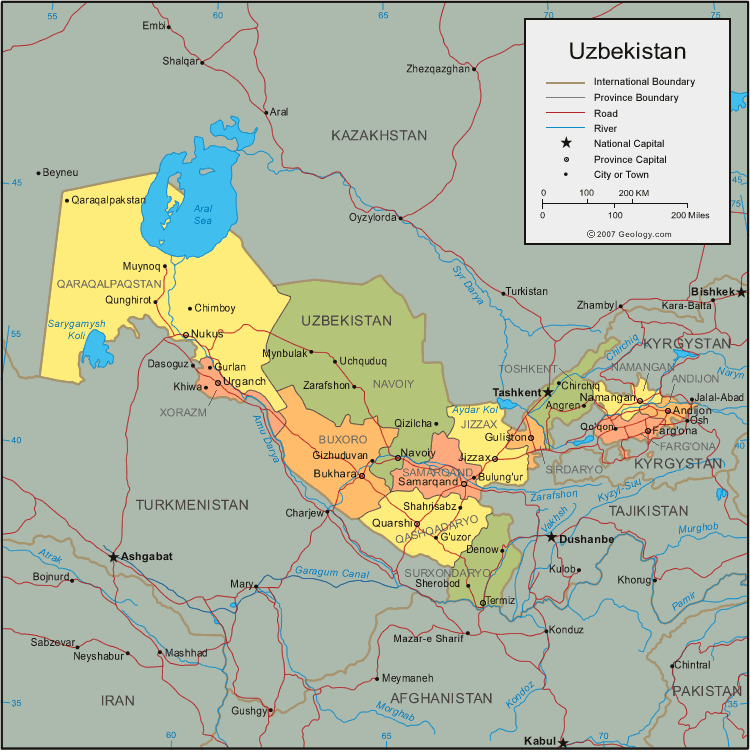History Of Uzbekistan

The history of Uzbekistan, its culture and statehood, foreign economic and social ties of the territory is more than 2.5 millennia. Uzbekistan's freedom loving population fought for its independence against all foreign invaders during centuries. Situated on the crossroads of the
Great Silk Road, the region played an important role in the dialogue of different civilizations. its flourishing in the ancient times, then during the reign of the Samanids and Timurids is connected with the involvement of the region in the international economic interrelations.
As far back as in the pre-Islamic period, Zoroastrism -- the world spread religious system was born on the territory of the present day Uzbekistan (in Khorezm) and became common property of all mankind. There was formed the highest technological culture of those times: town-planning, irrigation systems, armory, silk-weaving, cultivation of grain, cotton, grapes and fruits. In those times local technologies and master-craftsmen (Ustos) were highly valued and appreciated. The synthetic character is rather typical for this particular civilization: Combination of achievements gained by the Sogdians, peoples of Khorezm, Turks, India, China, Iran, Middle East and by Hellenism.
The religious extension of Islam to Maverannahr, accompanied by military invasions of the Arabs in the 7-8th centuries met with the resistance from the local religious tradition, embodied in the Zoroastrism of the Sogdians and Backtrians, Buddhism of the residents of Balkh and the Upper Amudarya, and the growing authority of the Christian communities. However later on the population of the region was convinced in the great cultural and moral possibilities of Islam.
The final victory of Islam in Turan may be related to the creation of politically and spiritually united state of the Samanid Turks in the 9th century with the center in the Zarafshan oasis (Samarkand and Bukhara). It was based on the rise of trade and development of the local artisans' production export.
The new spiritual and economic situation in Central Asia determined a new technological progress. It seems to be appropriate to mark the production of the Samarkand paper (since the 8th century under the Chinese influence the people of Samarkand learned to manufacture paper from the rags), which supplanted papyrus and parchment in the Moslem countries at the end of the 10th century. The real flourishing of the genetic fund of the population was caused by the abundance of grain. Scientists
al-Khorezmi, Beruni, Farabi, Abu Ali ibn Sino (Avicenna) brought fame to their Motherland all over the world. They were respected by Moslems, as well as Christians, Judaists and Buddhists.
The Islamic spiritual and political Renaissance after the Mongols invasion was based not only on the strategic plans of nobility but first and foremost on the needs of the population majority to liberate Central Asian civilization from the brute power and animosity between the tribes. Feeling that necessity, Timur (1336-1405) united townsfolk, countryfolk and steppe communities of Maverannahr. Under the power of Timur military victories were consolidated by creating a complicated system of the administrative governing, and the common norms of law ("Code of Timur"). Considerable funds were given from the state treasury for the construction of grandiose public structures, gardens, roads and canals. The Timurids Renaissance in the 15th and the first half of the 16th century is based on the cultural-economic integration of the region. The area of its rich technological potential was extended up to the Mediterranean Sea and Northern India (culture of the Great Mogul Empire), Many scientific achievements of the Timurids epoch made a great impact on the European science (it is enough to mention the astronomical tables of Samarkand astronomers from Ulughbek's observatory).
At the turn of the 15-16th centuries Vasco de Gama's ships blazed the Sea route from Europe to India and further on to China. The region lost its strategic economic importance on which it had rested for two millennia. The region happened to turn a political and economic periphery zone. The technological potential of Central Asia found itself locked from the outside world development for almost 3 centuries. Colonial annexation of Central Asia by the Tsarist Russia in 1860 bound Turkestan with Russia for 130 years.
Foreign economic and international contacts of the region were monopolized first by St. Petersburg and then by the Soviet Moscow. Beginning with 1890's and up to 1917, Turkestan was a part of the Russian Empire, its governor-general's province, and its rule was the charge of war ministry, which also played the role of the ministry of colonies. Economic calculation of that period show that the region both paid the Russian colonization and gave a certain income to the treasury of the state. It is rather interesting that the advanced American technologies and cotton varieties were used in the region at that time.
After the collapse of Tsarism, Turkestan received the chance for its rebirth. Diplomatic missions of many countries including the USA mission were represented in Tashkent in 1918-1919. But in 1924 there was an artificial division of the single ethnic, cultural and economic space of the Turkestan land into the Soviet national republics. Millions of Uzbeks, Kazakhs, Kyrghyzes and Turkmen happened to be separated. Under the oppression of the totalitarian system the national liberation movement of native people was transferred into spiritual sphere. A dream of liberation, national state and unified Turkestan never died. The collapse of the former USSR created a situation which the people of Uzbekistan expected.
On August 31, 1991, the Parliament adopted the Declaration of the State Independenceof the Republic of Uzbekistan. On December 29, 1991, this decision was supported by referendum. This was the beginning of the history of our country - the country open to the world community.








 +99890 979 38 98
+99890 979 38 98 +99871 252 52 32
+99871 252 52 32 +99871 252 61 84
+99871 252 61 84



























